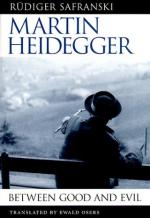|
This section contains 1,920 words (approx. 7 pages at 300 words per page) |

|
The mere fact that Heidegger has thought Trakl worthy of his particular form of exegesis, which combines what seems like close textual analysis with the most far-reaching philosophical deductions, implies one kind of affinity between Trakl and the other German poets—Hölderlin and Rilke—to whom Heidegger has devoted [studies similar to his Georg Trakl]; this affinity, of course, is one of perception, and it undoubtedly exists. But only a poet who uses words with the utmost precision, and with the utmost consistency as well, can be expected to bear the weight of Heidegger's exegesis; and Trakl's use of imagery, on which every interpretation of his poems must rest, was not consistent. (p. 250)
[It] is from Hölderlin that [Heidegger] derived many of his ideas about the function of poetry, and it is in the light of these ideas that he examines Trakl's work, inevitably linking it...
|
This section contains 1,920 words (approx. 7 pages at 300 words per page) |

|


